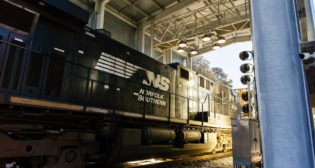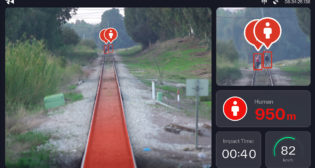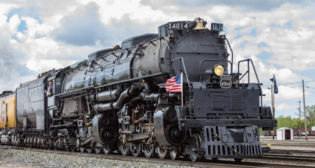
Congress Proposes Launch of Freight Rail Innovation Institute
Written by Marybeth Luczak, Executive Editor
U.S. Reps. Conor Lamb (D-Pa., 17) and Mike Doyle (D-Pa., 18) have introduced legislation that would launch an institute “for the design, development, manufacturing and operation of zero-emission battery and hydrogen-powered freight locomotives,” and “enhance freight rail safety, efficiency and utilization,” among other measures.
New legislation has been introduced in Congress to establish a Freight Rail Innovation Institute (FRII) in which a university research partner and a locomotive manufacturer would work to develop zero-emission locomotives.
U.S. Reps. Conor Lamb (D-Pa., 17) and Mike Doyle (D-Pa., 18) introduced the Freight Rail Innovation Act (download below) on May 20. U.S. Sen. Bob Casey (D-Pa., 6) presented companion legislation in the Senate.
Wabtec President and CEO Rafael Santana recently called on Congress to collaborate with his Pittsburgh, Pa.-based company, Carnegie Mellon University and Genesee & Wyoming to “create, coordinate and co-fund” such an institute, which would “send a message to the entire transportation industry that together, the private and public sectors can help achieve the nation’s vision of a competitive and sustainable American freight transportation network.”
Through the proposed Act, the FRII would develop technologies “for the design, development, manufacturing and operation of zero-emission battery and hydrogen-powered freight locomotives,” and “enhance freight rail safety, efficiency and utilization,” according to Reps. Lamb and Doyle. It would also “accelerate the deployment of zero-emission locomotives, including passenger locomotives, as well as support supply chains, advance freight and logistics systems, and [participate in] related workforce development and education” initiatives. The FRII would be established by the Secretary of Transportation, in coordination with the Secretary of Energy and representatives of the National Laboratories, the National Institute of Standards and Technology, and the National Science Foundation, and in partnership with an eligible higher-education institution and a freight rail locomotive manufacturer.
Teams consisting of at least one higher-education institution and one freight rail locomotive manufacturer would be able to apply to the USDOT to launch the FRII, according to the Act. Each team would be required to enter a “cost-sharing agreement” and to submit a proposal, including how the FRII would carry out its duties as well as a signed Memorandum of Understanding addressing “all aspects of the Institute’s work, including how intellectual property and revenue sharing from resulting technological developments will be handled,” among other details.
The Act would appropriate $120 million “for each 11 of the fiscal years 2022 through 2026, to carry out the activities of the Institute.” It includes “Buy America and Davis-Bacon prevailing wage requirements for Institute grant recipients, and requires a 50% non-federal match.”

“This legislation is a perfect example of Congress working together with industry and academic leaders to develop new and innovative transportation technologies,” Rep. Lamb said. “This federal funding could be used locally in western Pennsylvania to accelerate the development of hydrogen-powered locomotives, creating jobs in the energy industry and boosting our local economy.”
Lamb is a member of the House Committee on Transportation & Infrastructure, which held a March 17 hearing on “The Business Case for Climate Solutions.” Wabtec’s Santana was among those testifying, and he discussed the establishment of an FRII. He said Wabtec and its partners “are committed to developing the technology to enable the expansion of freight rail utilization, accelerating the reduction of GHG emissions with battery- and hydrogen-powered locomotives, and enabling safer trains.” Santana was recently selected as an Influential Leader in Railway Age’s second-annual readers’ online poll.




